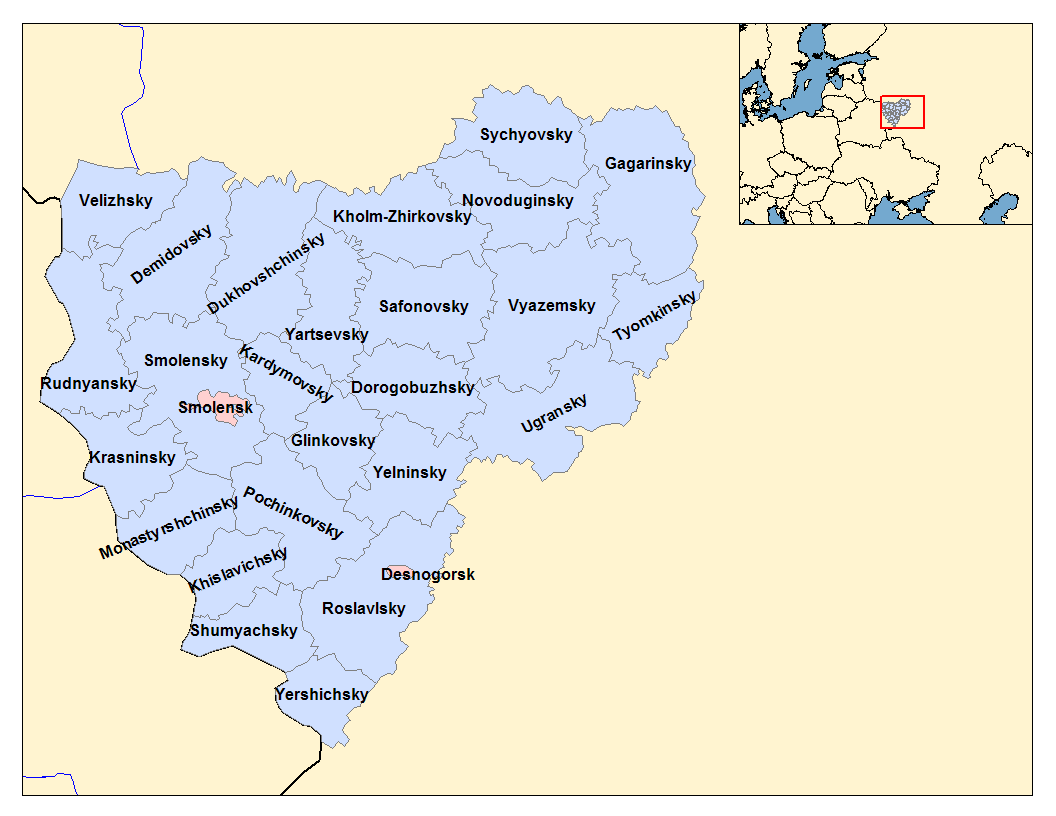|
Smolensk Archive
The Smolensk Archive is the name given to the archives of Smolensk Oblast Communist Party of the Soviet Union, which were captured intact by the army of Nazi Germany when it conquered the city of Smolensk in 1941. It also included the NKVD and the Smolensk State Oblast archives. The archive was then moved to Germany. In summer and autumn of 1941, and again in the summer of 1942 during the advance of German troops, local authorities tried to evacuate archives to the east, and the vast majority of the local archives were moved at great cost. German troops entered Smolensk on July 15, 1941 and as a result, the archive was seized by the Germans and they made propaganda out of it by publishing the documents about repression. In May 1943 the archive was taken by the Germans from Smolensk to Vilnius, then in Poland, where it was isolated from much other material taken to Germany. The remaining part of the documents in Poland were found by Soviet troops in February 1945 in the area of the ra ... [...More Info...] [...Related Items...] OR: [Wikipedia] [Google] [Baidu] |
Smolensk Oblast
Smolensk Oblast (russian: Смоле́нская о́бласть, ''Smolenskaya oblast''; informal name — ''Smolenschina'' (russian: Смоле́нщина)) is a federal subject of Russia (an oblast). Its administrative centre is the city of Smolensk. As of the 2010 Census, its population was 985,537. Geography The oblast was founded on 27 September 1937.Исполнительный комитет Смоленского областного совета народных депутатов. Государственный архив Смоленской области. "Административно-территориальное устройство Смоленской области. Справочник", изд. "Московский рабочий", Москва 1981. Стр. 8 It borders Pskov Oblast in the north, Tver Oblast in the northeast, Moscow Oblast in the east, Kaluga Oblast in south, Bryansk Oblast in the southwest, and Mogilev and Vitebsk Oblast ... [...More Info...] [...Related Items...] OR: [Wikipedia] [Google] [Baidu] |
Richard Pipes
Richard Edgar Pipes ( yi, ריכארד פּיִפּעץ ''Rikhard Pipets'', the surname literally means 'beak'; pl, Ryszard Pipes; July 11, 1923 – May 17, 2018) was an American academic who specialized in Russian and Soviet history. He published several books critical of communist regimes throughout his career.Kenez, Peter, and Richard Pipe. “The Prosecution of Soviet History: A Critique of Richard Pipes' The Russian Revolution.” The Russian Review, vol. 50, no. 3, 1991, pp. 345–351. JSTORhttps://www.jstor.org/stable/131078 Accessed 4 June 2021. In 1976, he headed Team B, a team of analysts organized by the Central Intelligence Agency (CIA) who analyzed the strategic capacities and goals of the Soviet military and political leadership. Pipes was the father of American historian Daniel Pipes. Pipes was born to a Jewish family in Cieszyn, Poland, which fled the country as refugees after it was invaded by Nazi Germany. Settling in the United States in 1940, he became a natu ... [...More Info...] [...Related Items...] OR: [Wikipedia] [Google] [Baidu] |
History Of Smolensk Oblast
Smolensk Oblast (russian: Смоле́нская о́бласть, ''Smolenskaya oblast''; informal name — ''Smolenschina'' (russian: Смоле́нщина)) is a federal subject of Russia (an oblast). Its administrative centre is the city of Smolensk. As of the 2010 Census, its population was 985,537. Geography The oblast was founded on 27 September 1937.Исполнительный комитет Смоленского областного совета народных депутатов. Государственный архив Смоленской области. "Административно-территориальное устройство Смоленской области. Справочник", изд. "Московский рабочий", Москва 1981. Стр. 8 It borders Pskov Oblast in the north, Tver Oblast in the northeast, Moscow Oblast in the east, Kaluga Oblast in south, Bryansk Oblast in the southwest, and Mogilev and Vitebsk Oblast ... [...More Info...] [...Related Items...] OR: [Wikipedia] [Google] [Baidu] |
Archives In The Soviet Union
An archive is an accumulation of historical records or materials – in any medium – or the physical facility in which they are located. Archives contain primary source documents that have accumulated over the course of an individual or organization's lifetime, and are kept to show the function of that person or organization. Professional archivists and historians generally understand archives to be records that have been naturally and necessarily generated as a product of regular legal, commercial, administrative, or social activities. They have been metaphorically defined as "the secretions of an organism", and are distinguished from documents that have been consciously written or created to communicate a particular message to posterity. In general, archives consist of records that have been selected for permanent or long-term preservation on grounds of their enduring cultural, historical, or evidentiary value. Archival records are normally unpublished and almost alway ... [...More Info...] [...Related Items...] OR: [Wikipedia] [Google] [Baidu] |
Schneerson
Schneersohn (or Schneerson) is a Jewish surname used by many of the descendants of the Rabbi Shneur Zalman of Liadi, the first Rebbe of the Chabad-Lubavitch Hasidic movement. Origins Rabbi Shneur Zalman of Liadi (1745 – 1812), founded the Chabad Hasidic movement in 1775.Agudas Chasidei Chabad of United States v. Gourary NO. CV-85-2909 His son, Rabbi (1773 – 1827), the second Chabad Rebbe, adopted the "Schneuri" surname after his father's first name. The first to use the "Schneersohn" surname was Rabbi |
Hasidic Judaism
Hasidism, sometimes spelled Chassidism, and also known as Hasidic Judaism (Ashkenazi Hebrew: חסידות ''Ḥăsīdus'', ; originally, "piety"), is a Judaism, Jewish religious group that arose as a spiritual revival movement in the territory of contemporary Western Ukraine during the 18th century, and spread rapidly throughout Eastern Europe. Today, most affiliates reside in Israel and the United States. Israel Ben Eliezer, the "Baal Shem Tov", is regarded as its founding father, and his disciples developed and disseminated it. Present-day Hasidism is a sub-group within Haredi Judaism and is noted for its religious conservatism and social seclusion. Its members adhere closely both to Orthodox Judaism, Orthodox Jewish practice – with the movement's own unique emphases – and the traditions of Eastern European Jews. Many of the latter, including various special styles of dress and the use of the Yiddish language, are nowadays associated almost exclusively with Hasidism. Hasi ... [...More Info...] [...Related Items...] OR: [Wikipedia] [Google] [Baidu] |
Chabad-Lubavitch
Chabad, also known as Lubavitch, Habad and Chabad-Lubavitch (), is an Orthodox Jewish Hasidic dynasty. Chabad is one of the world's best-known Hasidic movements, particularly for its outreach activities. It is one of the largest Hasidic groups and Jewish religious organizations in the world. Unlike most Haredi groups, which are self-segregating, Chabad operates mainly in the wider world and caters to secularized Jews. Founded in 1775 by Rabbi Schneur Zalman of Liadi, the name "Chabad" () is an acronym formed from three Hebrew words— (the first three sephirot of the kabbalistic Tree of Life) (): "Wisdom, Understanding, and Knowledge"—which represent the intellectual and kabbalistic underpinnings of the movement. The name Lubavitch derives from the town in which the now-dominant line of leaders resided from 1813 to 1915. Other, non-Lubavitch scions of Chabad either disappeared or merged into the Lubavitch line. In the 1930s, the sixth Rebbe of Chabad, Rabbi Yosef Yitzcha ... [...More Info...] [...Related Items...] OR: [Wikipedia] [Google] [Baidu] |
Robert Conquest
George Robert Acworth Conquest (15 July 1917 – 3 August 2015) was a British historian and poet. A long-time research fellow at Stanford University's Hoover Institution, Conquest was most notable for his work on the Soviet Union. His books included '' The Great Terror: Stalin's Purges of the 1930s'' (1968); '' The Harvest of Sorrow: Soviet Collectivisation and the Terror-Famine (1986)''; and '' Stalin: Breaker of Nations'' (1991). He was also the author of two novels and several collections of poetry. Early life and education Conquest was born in Great Malvern, Worcestershire, to an American father, Robert Folger Wescott Conquest, and an English mother, Rosamund Alys Acworth. His father served in an American Ambulance Field Service unit with the French Army in World War I, and was awarded the Croix de Guerre, with Silver Star in 1916. Conquest was educated at Winchester College, where he won an exhibition to study Philosophy, Politics and Economics (PPE) at Magdalen Coll ... [...More Info...] [...Related Items...] OR: [Wikipedia] [Google] [Baidu] |
Merle Fainsod
Merle Fainsod (May 2, 1907 – February 11, 1972) was an American political scientist best known for his work on public administration and as a scholar of the Soviet Union. His books ''Smolensk under Soviet Rule'', based on documents captured by the German Army during World War II, and ''How Russia is Ruled'' (also known as ''How the Soviet Union is Governed'') helped form the basis of American study of the Soviet Union, and established him "as a leading political scientist of the Soviet Union."Carlisle, p. 111 Fainsod is also remembered for his work in the Office of Price Administration and as the director of the Harvard University Library. Biography Fainsod was born in McKees Rocks, Pennsylvania on May 2, 1907, and spent his childhood years there. In 1920, after the death of his father, Fainsod's family moved to St. Louis. Fainsod attended Washington University in St. Louis, graduating in 1928 with a B.A. in political science and an M.A. in 1930. He then began his Ph.D at Har ... [...More Info...] [...Related Items...] OR: [Wikipedia] [Google] [Baidu] |
Communist Party Of The Soviet Union
"Hymn of the Bolshevik Party" , headquarters = 4 Staraya Square, Moscow , general_secretary = Vladimir Lenin (first) Mikhail Gorbachev (last) , founded = , banned = , founder = Vladimir Lenin , newspaper = ''Pravda'' , position = Far-left , international = , religion = State Atheism , predecessor = Bolshevik faction of the RSDLP , successor = UCP–CPSU , youth_wing = Little Octobrists Komsomol , wing1 = Young Pioneers , wing1_title = Pioneer wing , affiliation1_title = , affiliation1 = Bloc of Communists and Non-Partisans (1936–1991) , membership = 19,487,822 (early 1989 ) , ideology = , colours = Red , country = the Soviet Union The Communist Party of the Soviet Union (CPSU),; abbreviated in Russian as or also known by various other names during its history, was the founding and ruling party of the Soviet Union. Th ... [...More Info...] [...Related Items...] OR: [Wikipedia] [Google] [Baidu] |
Offenbach Am Main
Offenbach am Main () is a List of cities and towns in Germany, city in Hesse, Germany, on the left bank of the river Main (river), Main. It borders Frankfurt and is part of the Frankfurt urban area and the larger Frankfurt Rhein-Main Regional Authority, Frankfurt Rhein-Main urban area. It has a population of 138,335 (December 2018). In the 20th century, the city's economy was built on machine-building, leather-making, typography and design, and the automobile and pharmaceutical industries. Geography Subdivision The inner city area of Offenbach is quite large and consists of the historic center of the city and its expansions of the 1800s. Three formerly independent suburbs were incorporated in the first half of the 20th century: Offenbach-Bürgel, Bürgel being the first in 1908, then Offenbach-Bieber, Bieber and Offenbach-Rumpenheim, Rumpenheim in 1938 and 1942. South of the inner city area are the suburbs Offenbach-Lauterborn, Lauterborn, Offenbach-Rosenhöhe, Rosenhöhe and Te ... [...More Info...] [...Related Items...] OR: [Wikipedia] [Google] [Baidu] |
Office Of Strategic Services
The Office of Strategic Services (OSS) was the intelligence agency of the United States during World War II. The OSS was formed as an agency of the Joint Chiefs of Staff (JCS) to coordinate espionage activities behind enemy lines for all branches of the United States Armed Forces. Other OSS functions included the use of propaganda, subversion, and post-war planning. The OSS was dissolved a month after the end of the war. Intelligence tasks were shortly later resumed and carried over by its successors the Department of State's Bureau of Intelligence and Research (INR), and the independent Central Intelligence Agency (CIA). On December 14, 2016, the organization was collectively honored with a Congressional Gold Medal. Origin Prior to the formation of the OSS, the various departments of the executive branch, including the State, Treasury, Navy, and War Departments conducted American intelligence activities on an ''ad hoc'' basis, with no overall direction, coordination, or ... [...More Info...] [...Related Items...] OR: [Wikipedia] [Google] [Baidu] |






.jpg)
